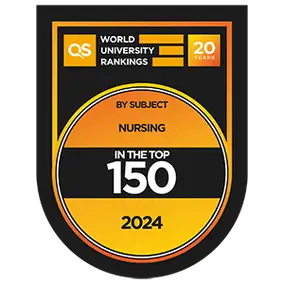Type of qualification
Level of study
An undergraduate qualification is usually the first one you study.
Our courses follow the New Zealand Qualification Framework (NZQF) levels.
Time to complete
Where you can study
International students
International students are not New Zealand citizens or residents.
Study a Bachelor of Nursing – BN
Graduates of the Bachelor of Nursing at Massey University are dynamic, adaptable and critical thinkers.
The Bachelor of Nursing includes science and social science courses related to health which are integrated into nursing knowledge.
Clinical learning takes place in many different areas including surgical, emergency, medical, mental health and primary care services.
You will become a knowledgeable and skilful professional nurse, contributing to the health of individuals and communities.
What is a nurse?
- A professional in the healthcare field who combines the art of caring and compassion with scientific skills and knowledge.
- A professional who leads care for people who are facing an urgent or ongoing health issue.
- An educator of people on the issues of healthy living and wellness.
- A professional who undertakes all aspects of assessment and treatment in partnership with other health professionals.
More compelling reasons to join us in nursing
- Our graduates are sought after and work ready.
- Massey’s nursing qualification is taught by the largest number of highly qualified nursing lecturers in the country.
- We offer our undergraduate nursing degree on two different campuses – Manawatū and Wellington. We work with multiple stakeholders in healthcare.
- Our contemporary, research-led qualifications are approved by the New Zealand Nursing Council.
- Our graduates are work-ready and sought after to meet the health needs of people, whanau and communities.
Nursing simulation suites
We offer contemporary clinical simulation in our new clinical suites. Each suite is different, but most have a mock hospital setting and two-way observation spaces. They also have standard nursing equipment for hospital and community work. You will learn and practice nursing skills through role-play, case studies and simulations using state-of-the-art manikins.
Empathy Labs
You will participate in Empathy Labs by wearing special suits. These simulate what it's like to attempt normal daily tasks after suffering a stroke, or the restrictions of declining health.
Further study
Many of our Bachelor of Nursing graduates continue with their studies after qualifying as registered nurses by undertaking a master’s degree in nursing. A number of our Master of Nursing graduates have successfully gained registration as nurse practitioners with prescribing rights. We can also offer you a PhD in nursing.
A BN is a good fit if you:
- want to make a difference in someone’s life every day
- want to be the health professional most often present with people at their most vulnerable
- want to improve the health and wellbeing of individuals, families/whānau, community and the nation.
Entry requirements
Admission to Massey
All students must meet university entrance requirements to be admitted to the University.
Specific requirements
This is a ‘selected entry’ qualification. This means as well as applying you will need to provide additional material as part of your application.
You will be selected into the qualification on the basis of a process which includes providing:
- a curriculum vitae of approximately three pages, which should include your academic and work history
- details of two character referees – these must not be family or friends but could be the confidential report from your school or institution (if applying straight from secondary school or a private training establishment).
- a completed vetting service request and consent form for a New Zealand Police check – a criminal record check under the Criminal Records (Clean Slate) Act 2004
- a current police certificate from any overseas countries you have lived in for 12 months or more in the last 10 years
- complete the Health and Disability Declaration.
You may be required to attend an interview.
To become a registered nurse, you will also have requirements during and at the end of your study.
Once you have been accepted into the Bachelor of Nursing
Once you are successful at gaining a place in the Bachelor of Nursing, you will also need to complete further tasks. These are to meet the requirements set down by the Nursing Council of New Zealand for registration as a nurse in New Zealand (in terms of your good character and fitness to be a nurse). You will need to:
-
fill out a VCA 2014 Questionnaire – Vulnerable Children Act 2014 (VCA 2014)
-
hold a current Comprehensive First Aid Certificate (NZQA unit standards 6402, 6401 and 6400) for example Red Cross Comprehensive First Aid or St John First Aid Level 2
-
meet the immunisations standards of practice for healthcare professionals in New Zealand, in order to be eligible for Clinical Placement (a compulsory part of the qualification). This includes, Hepatitis B, Varicella (Chicken pox), Measles, Pertussis (Whooping cough) and Tuberculosis (TB). Further details will be sent to you after you apply.
-
be fully vaccinated against COVID-19, in order to meet the requirement for clinical placements. We require all nursing students to be vaccinated prior to the commencement of study.
Registration as a Nurse
At the end of your study
A similar procedure will be repeated by the Nursing Council of New Zealand at the end of your study upon your application to sit the State Final Exam to become a registered nurse.
English language requirements
If English is not your first language you must also supply a copy of your results in an Academic International English Language Testing System (IELTS) test. IELTS is the only test accepted. You must have achieved at least 6.5 across all bands with no band less than 6.5 within the preceding two years.
Campus
Nursing is available on Massey's Manawatū and Wellington campuses. As places are limited we encourage you to apply early. Should a campus reach its maximum number of places you will be waitlisted and contacted regarding other options.
Application closing date
Applications close on 31 January of the year of study. Late applications that are complete may be considered if places allow.
About referees
Referees need to be able to provide informed responses on your personal suitability for the qualification. A referee should be someone who has known you for one year or more in the capacity of employer, educator, work colleague or person of community standing, ie kaumātua, minister or similar. Your referee should not be a friend, flatmate, relative or someone who has known you for less than year. The information your referee supplies is confidential to those involved in the selection process.
Prior learning, credit and exemptions
Transfers
If you are a nursing student from another institution wishing to transfer into the Bachelor of Nursing at Massey, please contact us prior to making any application. You will need to provide an academic transcript from your current provider along with a reference from the Head of School/qualification, number of clinical hours completed, and the course outlines (prescription and learning outcomes). Applications for transfer need to be submitted no later than 1 October for the following academic year.
For information on prior learning, exemptions and transfer of credit or other questions:
- review the Recognition of Prior Learning regulations
- contact us through the Get advice button on this page.
English language skills
If you need help with your English language skills before you start university, see our English for Academic Purposes (EAP) courses.
Maximum time limits for completion
There are maximum time limits to complete this qualification. If you do not complete within the maximum time, you may be required to re-apply for the qualification if you wish to continue your studies.
The Bachelor of Nursing is normally completed in three years of full-time study. If you are granted any extensions during your studies, the maximum time to complete this qualification is five years.
- Look for information under ‘Completion Requirements’ in the regulations for this qualification
- Contact us through the Get advice button on this page if you have any questions.
Official regulations
To understand what you need to study and must complete to graduate read the official rules and regulations for this qualification.
You should read these together with all other relevant Statutes and Regulations of the University including the General Regulations for Undergraduate Degrees, Undergraduate Diplomas, Undergraduate Certificates, Graduate Diplomas and Graduate Certificates.
Returning students
For returning students, there may be changes to the majors and minors available and the courses you need to take. Go to the section called ‘Transitional Provisions’ in the Regulations to find out more.
In some cases the qualification or specialisation you enrolled in may be no longer be taking new enrolments, so may not appear on these web pages. To find information on the regulations for these qualifications go to the Massey University Calendar.
Please contact us through the Get advice button on this page if you have any questions.
Structure of the Bachelor of Nursing
The Bachelor of Nursing is a parts-based qualification. That means you must complete the first part and meet some requirements, before moving to the second, etc. There are three parts in total.
Classroom sessions as well as clinical experiences may need to be undertaken outside of normal semester times and/or over the summer period. Travel to clinical placements will be required.
Typical pattern for the Bachelor of Nursing
Core courses These courses are a compulsory part of your qualification.
Blocks of clinical practice Integrated into your courses each year.
| Year one |
|---|
| 150112 Hauora Tangata: Foundations of Māori Health |
| 168171 Professional Nursing I |
| 168172 Nursing Practice I: Foundations of Care |
| 168173 Nursing Practice II: Foundations of Practice (30 credits) |
| 231107 Social Determinants of Health |
| 214101 Human Bioscience: Normal Body Function |
| 214102 Applied Sciences for Health Professionals |
| Within its courses, year one includes one 3-week clinical practice block of 120 hours |
| Year two |
|---|
| 168271 Professional Nursing II |
| 168272 Nursing Practice III: Integrated Care (60 credits) |
| 168273 Evidence-based Nursing Practice |
| 214201 Human Bioscience: Impaired Body Function |
| 214202 Pharmacology |
| Within its courses, year two includes two 3-week clinical practice blocks of 120 hours each; and one 2-week clinical practice block of 80 hours |
| Year three (from 2024) |
|---|
| 168371 Professional Nursing III |
| 168372 Nursing Practice IV: Acute Care (45 credits) |
| 168373 Preparing for Professional Excellence |
| 168374 Nursing Practice V: Pre-Graduate (45 credits) |
| Within its courses, year three includes three 3-week clinical practice blocks of 120 hours each; and one 9-week clinical practice block of 360 hours |
Courses are each worth 15 credits, unless otherwise indicated
Courses and specialisations
Key terms
- Courses
- Each qualification has its own specific set of courses. Some universities call these papers. You enrol in courses after you get accepted into Massey.
- Course code
- Each course is numbered using 6 digits. The fourth number shows the level of the course. For example, in course 219206, the fourth number is a 2, so it is a 200-level course (usually studied in the second year of full-time study).
- Credits
- Each course is worth a number of credits. You combine courses (credits) to meet the total number of credits needed for your qualification.
- Specialisations
- Some qualifications let you choose what subject you'd like to specialise in. Your major or endorsement is what you will take the majority of your courses in.
Credit summary
360 credits
- Part One compulsory 100‑level courses – 120 credits
- Part Two compulsory 200‑level courses – 120 credits
- Part Three compulsory 300‑level courses – 120 credits
- At least 1100 hours of approved clinical practice and associated reports.
This is a parts-based qualification. This means there are regulations around completion of Part One before progressing to Part Two etc.
Course planning key
- Prerequisites
- Courses that need to be completed before moving onto a course at the next level. For example, a lot of 200-level courses have 100-level prerequisite courses.
- Corequisites
- Courses that must be completed at the same time as another course are known as corequisite courses.
- Restrictions
- Some courses are restricted against each other because their content is similar. This means you can only choose one of the offered courses to study and credit to your qualification.
Part One (Choose 120 credits from)
Course code: 150112 Hauora Tangata: Foundations of Māori Health 15 credits
An introduction to understanding Māori health within Aotearoa/New Zealand.
View full course detailsCourse code: 168171 Professional Nursing I 15 credits
A focus on professional identity and the context of nursing in Aotearoa New Zealand.
View full course detailsCourse code: 168172 Nursing Practice I: Foundations of Care 15 credits
An introduction to the experience and reflection on beginning knowledge, skills and attributes within simulated nursing settings.
View full course detailsCourse code: 168173 Nursing Practice II: Foundations of Practice 30 credits
Further development of the experience and reflection on knowledge, skills and attributes within simulated and placement settings.
View full course detailsCourse code: 214101 Human Bioscience: Normal Body Function 15 credits
Human body structure and function (anatomy and physiology), including relevant concepts of homeostasis and metabolism and development throughout the lifespan.
View full course detailsCourse code: 214102 Applied Sciences for Health Professionals 15 credits
An introduction to the basic scientific concepts that are relevant to the maintenance of human and environmental health.
View full course detailsCourse code: 231107 Social Determinants of Health 15 credits
This course explores the social determinants of health, the complex range of social, cultural and economic interactions that influence individual and population health and help explain health disparities amongst populations.
View full course detailsPart Two (No New Enrolments from 2023) (Choose 120 credits from)
Course code: 168261 Nursing Research and Evidence-based Practice 15 credits
A detailed critique of research methods in nursing, and the relevance and impact of evidence-based approaches on health care practice.
View full course detailsCourse code: 168262 Nursing People with Long Term Conditions 15 credits
An exploration of nursing theory and practice as it relates to persons, their families/whanau, and communities adapting to long-term physical health conditions or disability. A practicum is included to gain nursing experience in the context of long term conditions.
View full course detailsCourse code: 168263 Mental Health and Addictions Nursing I 15 credits
An exploration of nursing theory and practice as it relates to interpersonal skill development and working alongside persons, their families/whanau, and communities adapting to mental health conditions. A practicum is included to gain nursing experience in the context of long term mental health conditions.
View full course detailsCourse code: 168264 Primary Health Care and Health Promotion 15 credits
An exploration and application of the principles of primary health care and health promotion for persons, their families/whanau, and communities. A practicum is included to gain nursing experience in the primary health care context.
View full course detailsCourse code: 168265 Health Assessment and Clinical Decision-making II 15 credits
Consolidating and expanding health assessment theory and skill through focussing on a range of ill-health conditions.
View full course detailsCourse code: 168266 Professional Nursing Practice 15 credits
A critical exploration of ethical concepts and legal requirements for nursing as a regulated profession.
View full course detailsCourse code: 214201 Human Bioscience: Impaired Body Function 15 credits
An examination of the aetiology of disease and alteration of health status and the relevant scientific clinical tests, including the role of micro-organisms in disease processes.
View full course detailsCourse code: 214202 Pharmacology 15 credits
The study of pharmacokinetics, pharmacodynamics and pharmacogenetics; drug groups; principles of adverse drug effects; and drug interactions of prescription and non-prescription medication.
View full course detailsPart Two (from 2023) (Choose 120 credits from)
Course code: 168271 Professional Nursing II 15 credits
Explore in more depth an emerging professional identity and the complexities of the nursing context in Aotearoa New Zealand.
View full course detailsCourse code: 168272 Nursing Practice III: Integrated Care 60 credits
Learners experience and reflect on integrated knowledge, skills and attributes within simulated and multiple placement settings.
View full course detailsCourse code: 168273 Evidence-based Nursing Practice 15 credits
An exploration of the relevance and impact of evidence-based nursing on practice.
View full course detailsCourse code: 214201 Human Bioscience: Impaired Body Function 15 credits
An examination of the aetiology of disease and alteration of health status and the relevant scientific clinical tests, including the role of micro-organisms in disease processes.
View full course detailsCourse code: 214202 Pharmacology 15 credits
The study of pharmacokinetics, pharmacodynamics and pharmacogenetics; drug groups; principles of adverse drug effects; and drug interactions of prescription and non-prescription medication.
View full course detailsPart Three (No New Enrolments from 2024) (Choose 120 credits from)
Course code: 168361 Preparing for Professional Practice 15 credits
A critical exploration of contemporary health care structures and governing bodies that influence professional nursing.
View full course detailsCourse code: 168362 Nursing People with Acute Conditions 30 credits
Nursing practice is examined in regard to care for people and their families/whanau experiencing episodes of acute physical illness or trauma. A practicum is included to consolidate nursing skills in the acute medical/surgical care context.
View full course detailsCourse code: 168363 Mental Health and Addictions Nursing II 15 credits
Nursing practice is examined in regard to care for people and their families/whanau experiencing episodes of acute mental distress across the age continuum including the selection, and application of diagnostic screening tools for clinical decision-making. A practicum is included to gain experience and apply nursing skills in the acute care context.
View full course detailsCourse code: 168364 Pre-graduate Nursing Practice 30 credits
The practicum experience consolidates working realities of a novice nurse in a clinical setting.
View full course detailsCourse code: 168365 Leadership and Management in Nursing 15 credits
An exploration of contemporary nursing leadership and management.
View full course detailsCourse code: 168366 Contexts of Nursing Practice 15 credits
A critical examination of care delivery in specialist settings of nursing practice.
View full course detailsPart Three (from 2024) (Choose 120 credits from)
Course code: 168371 Professional Nursing III 15 credits
Advancement of a developing nursing professional identity within the complexities of the global community.
View full course detailsCourse code: 168372 Nursing Practice IV: Acute Care 45 credits
An advanced experience and reflection on knowledge, skills and attributes focused on acute care to care for individuals and whānau within simulated and multiple placement settings.
View full course detailsCourse code: 168373 Preparing for Professional Excellence 15 credits
An opportunity for students to consolidate learning from practice and theory to further their professional identity, sense of agency and contribution to the global nursing community.
View full course detailsCourse code: 168374 Nursing Practice V: Pre-Graduate 45 credits
Students begin the transition to registered nurse practice and meet Nursing Council of New Zealand competencies.
View full course detailsFees and scholarships
Fees, student loans and free fees scheme
Your tuition fees may be different depending on the courses you choose. Your exact fees will show once you have chosen your courses.
There will also be some compulsory non-tuition fees and for some courses, there may also be charges for things such as study resources, software, trips and contact workshops.
- Get an estimate of the tuition fees for your qualification
- View a list of non-tuition fees that may be payable
Already know which courses you're going to choose?
You can view fees for the courses that make up your qualification on the course details pages.
Student loans (StudyLink) and Fees Free scheme
You may be eligible for a student loan to help towards paying your fees.
The New Zealand Government offers fees-free tertiary study for eligible domestic students. Find out more about the scheme and your eligibility on the Fees Free website. To use the site's eligibility checking tool, you will need your National Student Number.
Current and returning Massey students can find their National Student Number in the student portal.
- Student loans (StudyLink)
- Fees Free
- Student portal
Scholarship and award opportunities
- Alfred George East Scholarship
- Massey University Bachelor of Nursing Scholarship
- Massey University Undergraduate Excellence Scholarship
- Massey University Undergraduate First Year Scholarship – School Leavers
- McEwan Pacific Student Scholarship
- New Zealand Seniors Aged Care Futures Grant
- OneChoice Futures Grant
- Te Pitomata Grants
Fees disclaimer
This information is for estimation purposes only. Actual fees payable will be finalised on confirmation of enrolment. Unless otherwise stated, all fees shown are quoted in New Zealand dollars and include Goods and Services Tax, if any. Before relying on any information on these pages you should also read the University's Disclaimer Notice.
Careers and job opportunities
Nursing is one of the most rewarding careers, as it is focused on supporting people, families and communities to manage a wide range of health challenges. Nurses are involved in all areas of health care and can choose to specialise in particular areas, such as intensive care, community mental health, aged care, or child and adolescent nursing. They can also become a specialist in particular conditions, such as diabetes, respiratory care or cancer nursing. Nurses can also choose to develop careers in health management, research and teaching.
Here are just a few examples of where you can work:
Primary and community health care:
- general practice
- Māori health services
- hospice
- district nursing
- community mental health.
Hospital-based care:
- neonatal units
- medical and surgical wards
- emergency departments
- intensive care
- paediatrics
- acute mental health services.
Population-based services:
- public health
- schools.
Specialty practice:
- mental health
- aged care
- child health
- family health
- rural and remote nursing.
What our students say
“Massey University has not only provided a foundation for my future in nursing, but it has also given me the opportunity to inspire and bring hope to my own whānau and friends.”

Ngāti Wai
“The entrepreneurial spirit and passion to make sure students get the best out of their study, really attracted me to Massey.”

“Massey helped me further my love of nursing through a comprehensive curriculum, dedicated lecturers, and top-notch facilities such as the simulation labs. The BN balances theoretical studies with hands-on learning, which equipped me with the skills to begin my successful career in nursing.”

Accreditations and rankings

Nursing Council of New Zealand
Our nursing qualifications are nationally and internationally recognised and approved by the Nursing Council of New Zealand. Upon completion you can apply for registration as a registered nurse with the Nursing Council of New Zealand.

QS Ranking - Nursing
Massey nursing is ranked in the world's top 150 universities by Quacquarelli Symonds (QS).
Related study options
Master of Clinical Practice (Nursing) – MClinPrac
Are you passionate about helping people? Massey’s Master of Clinical Practice (Nursing) is a vocationally focused qualification that is a postgraduate pathway to becoming a registered nurse.
Master of Nursing – MN
Massey’s Master of Nursing prepares you for a range of clinical leadership roles in specialty areas. Develop your advanced knowledge and skills in your chosen field through a mix of theoretical and clinical courses.
Postgraduate Certificate in Nursing – PGCertNurs
Take the next step in your nursing career. Massey’s Postgraduate Certificate in Nursing provides registered nurses with the knowledge needed to develop their professional practice within a clinical specialty.
Postgraduate Diploma in Nursing – PGDipNurs
Keen to take the next step in your nursing career? The Postgraduate Diploma in Nursing (PGDipNurs) will advance your practice and prepare you for further development towards senior nursing roles.
Useful planning information

Key information for students
Compare qualifications and academic information across different New Zealand institutions. Learn more on careers.govt.nz
